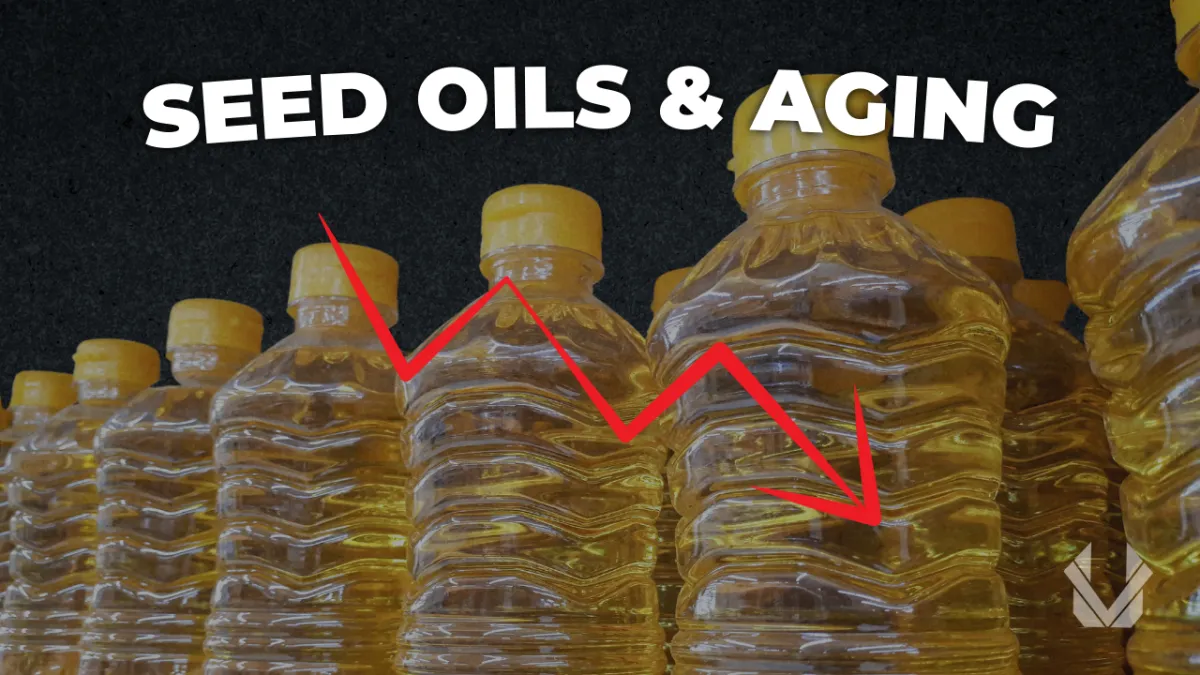THE UNYIELDING VIGOR BLOG
Our goal is to give you the most scientifically accurate and POWERFUL biological enhancement resources in the world
We're here to set new standards for truth, accuracy and effectiveness in the health industry. You'll find more value and scientific proof in our free articles than in most content you pay for.

Why this Nutrition PHD is WRONG: Seed Oils Accelerate Aging
Why this Nutrition PHD is WRONG: Seed Oils Accelerate Aging
Our mitochondrial functioning is a huge predictor of our overall health and longevity. For example, they power each cell in our bodies and our cells make up every single tissue in our bodies. And when our mitochondrial functioning goes down, we can see a reduction in VO2 max, which is associated with a worse longevity outcome in cardiovascular disease, and we see a higher rate of biological aging according to DNA methylation tests.
And so what we consume on a daily basis contributes significantly to our overall mitochondrial functioning. And one significant aspect of our diet is fatty acids. So the type of fats we consume really do matter because they can actually end up as part of cardiolipin, which is a phospholipid on the inner mitochondrial membrane, which is the same place where the electron transport chain exists, which produces ATP, which powers your cells.
And so when the wrong type of fatty acids, such as polyunsaturated fatty acids, become a part of this cardiolipin, or they make up more of cardiolipin than other types of fats, it's a problem because polyunsaturated fatty acids are more prone to oxidation in the body, and this has to do with them having more double carbon bonds. And so they can cause mitochondrial stress and overall reduce the cellular functioning. It's been proven on a mechanistic data that polyunsaturated fatty acids can raise MDA levels, which is a marker of oxidative stress, and they can reduce antioxidant defenses.
And so this is really important because when you actually look at another peptide known as SS31, this peptide has been shown to bind to cardiolipin, and it improves the overall mitochondrial functioning. It improves the heart function because, as you know, our heart actually has more mitochondria than any other organ in our body. And so this improves our cardiovascular function, and hence our VO2 max, and it's associated with a longer longevity.
So the problem I have here is that, first of all, Layne Norton made a video where he was mentioning that seed oils actually are good according to a randomized controlled trial. Well, I want to tell you something about randomized controlled trials. First of all, the two longest ones ever conducted in the history of our world so far, Sydney Coronary Experiment, which was six years, it's a randomized controlled trial, and the Minnesota Coronary Experiment, which was four years.
Now, these were well-controlled studies, and they evaluated polyunsaturated fatty acids consumption versus saturated fatty acids consumption in another group. And the main outcome of both of these studies was the same. There was an increased rate of cardiovascular-related deaths in the polyunsaturated fatty acid group, and there was an overall increased mortality in the polyunsaturated fatty acid group.
Now, some confusion arises here, because it's also been shown that the saturated fat group does have a higher LDL level of cholesterol. This is because polyunsaturated fatty acids do inhibit cholesterol synthesis to a degree, but despite that fact, they can't offset all the other damaging effects that come from the oxidation on cardiolipin and impaired mitochondrial and cellular functioning, which has devastating effects on our entire body. And so, in this video, I want to go over what Layne Norton was saying, because, you know, he was basically saying that mechanistic data doesn't mean anything, we've got to look at randomized controlled trials.
And I agree to an extent, but let me tell you why. I'll tell you a story. So, a while back, I've had people message me in regards to one specific mechanism that a peptide has, and they're concerned over this one mechanism causing an issue, such as, for example, pinealon has been shown to upregulate GDF11.
High levels of GDF11 have been associated with liver fibrosis, so people were worried that pinealon would cause liver fibrosis. Well, the problem is, it's been shown that rapamycin, through induction of autophagy, can prevent liver fibrosis while GDF11 treatment is administered. Well, pinealon has other mechanisms.
For example, it upregulates irisin. Irisin is a myokine, which induces autophagy in the liver, so it would counteract this, okay? And you can confirm it, too, by actually looking at the long-term human studies or animal studies, which show absolutely no signs of liver issues on imaging over a six month period of megadosing it, okay? Or let me give you another example. Epitalon.
Some people like to say that, okay, because it upregulates TERT gene expression, which is telomerase, that it could be worse for cancer. Well, the problem with that is that epitalon has tons of mechanisms downstream, which are literally anti-cancer and inhibit tumor growth. Let me give you another example.
Because even neuroscientists can fall victim to this looking at only mechanistic data trap, so I'm not saying that Layne Norton is completely wrong by what he says here. He raises a good point. So Andrew Huberman was talking about how BPC-157, through increasing VEGF, may contribute to cancer.
Okay, but, you know, exercise increases VEGF, but the blood from people who exercise has actually been shown to inhibit cancer growth. Or let me give you another example. Hyperbaric oxygen chamber therapy.
This increases VEGF as well, but it's also been shown to inhibit cancer growth. And so, I promise I'm getting to a point here. When Layne Norton said, only look at randomized controlled trials, and not just the individual mechanistic data, the only problem I have with this is that randomized controlled trials often control for the variables very poorly.
And a good example of this is the Identical Twin Study, which was released sometime early this year, or maybe last year, where they put one identical twin on a vegan diet, and the other identical twin on an omnivore diet. And they were evaluating different health markers, but also ones associated with longevity. So they looked at the DNA methylation tests, and also the telomere length.
And the outcome that they found was that the vegan group had better markers overall, a slower rate of aging. So a lot of people were quick to jump to the conclusion that, okay, this settles it, you know, veganism is the best, and omnivore is bad for longevity. And that's what a lot of people say, who just read like the title of a randomized controlled trial, maybe the abstract, and then the conclusion.
But when you look at the actual details, guys, you'll see that despite going through all the effort to bring in identical twins to this study, they fail to control for variables such as keeping the carbohydrate source between both groups consistent. Oh no, you have the omnivore group getting white rice, which is vastly insuperior to the quinoa, which the vegan group was getting. Okay, quinoa is much more nutrient dense, it doesn't have arsenic like rice does, but that's just one example, guys.
They're eating out at restaurants, and the omnivore group was rating a higher satisfaction to the food at the restaurants. This could be assumed that he could possibly be just ordering worse quality foods, which taste better, and they're probably cooked in seed oils and stuff at restaurants, because that's what they usually use. And so this study is basically garbage, guys.
I mean, if you're not going to control for at least the most important variables in a study and have the only difference be the actual protein source, then what's the point of even doing the study? And not to mention, you know, some of these randomized controlled trials, especially in nutrition science, are tricky because they may only be like six months long, maybe one year, but did you know linoleic acid has a half-life in the body of two years? So when it becomes part of cardiolipin and accumulates in your adipose tissue, it can actually stay there for quite a long time, guys. That's why the studies that I was looking at were six years and four years, respectively, for the Sydney Coronary Experiment and the Minnesota Coronary Experiment. So anyway, I hope this sums things up.
In regards to Layne Norton, I'd like him to actually pay a lot of attention to these randomized controlled trials, because when you look at the details, some things just don't add up. And I do think that looking at the mechanistic data in these cases is very important to confirm findings in these trials. So that's basically all I have to say on that.
I hope that you avoid seed oils. Don't fall into the scandal. Extra virgin olive oil, high in polyphenols, is great.
And Bryan Johnson's one is actually pretty good. Despite me just making a video reviewing Bryan Johnson's blueprint supplement stack and overall not recommending it due to just two main problems with it, go check out the video if you're interested in that, I do think that extra virgin olive oil he has is really good. It's high in polyphenols, and I have no problem with it.
It's usually single source. It even lists the source on it, and the testing data looks great. And if you're interested in cardiovascular health, you'll probably want to be using the vesugen peptide.
And this peptide has been shown to reverse the senescence-associated secretory phenotype in blood vessels. It's been shown to restore blood vessel function, lower LDL levels, and even reverse markers of biological aging. So if you haven't seen the video on my channel where I talk about vesugen, you should go check that out.
But that's it. And also, get your free Life-Changing Magic of Peptides course. It'll help you learn more about peptides and how they can be used to improve your health and longevity.
If you have little experience with peptides, our Perfect Peptide Starter Kit dives into 7 peptide protocols that will open the gates into a new existence. In this experience, you will discover peptides that can provide QUICK, SAFE and CHEAP results and the remarkable mechanisms behind them. Learn how to accelerate healing, crush anxiety, charge up your immune system, restore your gut, become a physical beast, master cold environments, and supercharge your libido!
This has been Brenden Henry. People call me the world's leading expert in peptide science, and I hope this has been helpful.
GET OUR NEW, FREE TESTOSTERONE SUPPLEMENT GUIDE FOR 2024
Toxic Testosterone: The Hidden Health Risks of the 6 Most Common Testosterone Supplements
(Created and proven with the results of 107 scientific studies)

Unleash Your Vigor & Conquer Your Limits!
-Unyielding Vigor

